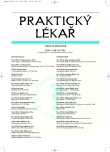Gastroesophageal reflux disease – questions and answers, myths and facts
Refluxní choroba jícnu - otázky a odpovědi, mýty a fakta
Refluxní choroba jícnu (RCHJ) je častým onemocněním. Setkáváme se s širokým spektrem pacientů od lehkých forem až po formy komplikované. Díky tomu, že všechny účinné léky u nás již mohou předepisovat praktičtí lékaři, přesunula se léčba velké části pacientů do jejich rukou, v trvalé péči gastroenterologů zůstávají povětšinou formy komplikované.
Nejen mezi praktickými lékaři, ale i mezi specialisty se však traduje mnoho mýtů, které ovlivňují přístup k léčbě této choroby. Mezi ně patří např. menší vědomí o chronicitě onemocnění, a tudíž nutnosti trvalé léčby, přesvědčení, že k refluxu dochází hlavně v noci v poloze vleže, přesvědčení, že každá hiátová hernie vyžaduje léčbu, omeprazol (u nás nejužívanější inhibitor protonové pumpy) se dávkuje navečer namísto ráno, přeceňuje se vliv prokinetik, zaměňují se názvy refluxní ezofagitida s refluxní chorobou jícnu, v léčbě se stále ve velké míře uplatňují „obsoletní" léky - antagonisté H2-receptorů nebo metoclopramid, nepanuje jasno v indikacích pH metrického vyšetření, panuje víra, že léčba antagonisty H2 receptorů je levnější oproti inhibitorům protonové pumpy, atd.
Rozhodli jsme se proto sepsat tento článek, kde se snažíme na některé z těchto mýtů poukázat. Činíme tak pokud možno co nejednoduší formou, bez zbytečného zacházení do detailů, neboť hlavní cílovou skupinou článku jsou praktičtí lékaři. Doufáme, že článek vyvolá nejenom zajímavou diskusi, ale přispěje k lepší péči o pacienty s RCHJ.
Klíčová slova:
Inhibitory protonové pumpy, antagonisté H2-receptorů, refluxní choroba jícnu
Authors:
J. Martínek 1; J. Špičák 2; O. Šlégl 1; M. Beneš 2
Authors‘ workplace:
Gastroenterologické oddělení, Prim. : MUDr. Jan Martínek, Ph. D. Chirurgické oddělení, Prim. : MUDr. Tomáš Verner Klaudiánova nemocnice, Mladá Boleslav, 2Klinika hepatogastroenterologie, IKEM Praha, Přednosta: doc. MUDr. Julius Špičák, CSc.
1
Published in:
Prakt. Lék. 2006; 86(10): 564-570
Category:
Various Specialization
Overview
Gastroesophageal reflux disease (GERD) is a common disease. Some patients present with a mild form while others with moderate or complicated forms of the disease. At present, GPs can prescribe all of the proton pump inhibitors available on the Czech market. Thus, the majority of patients with GERD are treated and followed by their GPs while patients with complications are usually treated by gastroenterologists.
However, there are many myths concerning GERD which have an impact on the management of patients with GERD. For example many GPs, as well as gastroenterologists, do not prescribe drugs for long term treatment as they do not consider GERD to be a chronic disease; doctors often think that the nocturnal reflux is more important than the day-time (upright) reflux (the contrary is true); each hiatal hernia is often considered to require surgical treatment; omeprazole (the most frequent PPI used in the Czech Republic) is administered in the evening instead of in the morning; the role of prokinetic drugs is often overestimated; the term “reflux esophagitis” is used inappropriately, many patients are treated inadequately by out-of date drugs such as H2 receptor antagonists or metoclopramide; the indications for pH metry monitoring are not clear; there is a belief that treatment with an H2-receptor antagonist is cheaper than with proton pump inhibitors (the contrary seems to be true); etc. In this article we try to serve as “myths busters” for GPs. We hope to provoke an interesting discussion and believe it will help to improve the management of patients with GERD.
Key words:
proton pump inhibitors, H2-receptor antagonists, gastroesophageal reflux disease
Labels
General practitioner for children and adolescents General practitioner for adultsArticle was published in
General Practitioner

2006 Issue 10
- Advances in the Treatment of Myasthenia Gravis on the Horizon
- Memantine in Dementia Therapy – Current Findings and Possible Future Applications
- Memantine Eases Daily Life for Patients and Caregivers
- Possibilities of Using Metamizole in the Treatment of Acute Primary Headaches
- Metamizole at a Glance and in Practice – Effective Non-Opioid Analgesic for All Ages
-
All articles in this issue
- Current state of tuberculosis epidemiology in the Czech Republic
- Human and avian influenza
- Gastroesophageal reflux disease – questions and answers, myths and facts
- Penis size and female sexual satisfaction
- Mammography for elderly women
- Our experience with pulmonary symptoms in patients with inflammatory bowel diseases.
- Small pulmonary tromboenolism
- Molecular diagnostics of prevalent hereditary gastrointestinal diseases: I. Liver diseases
- Observation of the hand as a diagnostic mirror of rheumatic and systemic diseases
- Early repolarization: how could be misinterpreted as an acute coronary ischemia
- Twenty four hour effectiveness of metoprolol tartrate in patients with newly diagnosed hypertension.
- General Practitioner
- Journal archive
- Current issue
- About the journal
Most read in this issue
- Early repolarization: how could be misinterpreted as an acute coronary ischemia
- Penis size and female sexual satisfaction
- Gastroesophageal reflux disease – questions and answers, myths and facts
- Twenty four hour effectiveness of metoprolol tartrate in patients with newly diagnosed hypertension.
